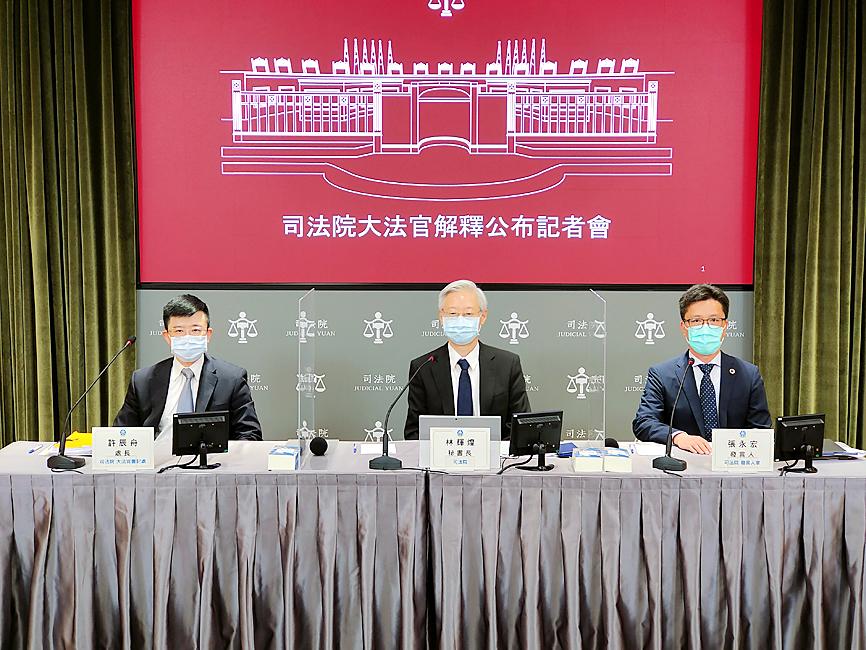Ordinances that require performers to pass tests before they can receive permits are unconstitutional, the Council of Grand Justices said yesterday in Constitutional Interpretation No. 806.
A street performer surnamed Chen (陳) in 2014 was issued five demerit points and banned from reapplying for a performers’ permit for a year after the Taipei City Government ruled that the number of people watching a performance of his had exceeded the maximum for the area he had applied to use, a breach of the now-defunct Regulations for Taipei Street Performers’ Performances.
Chen appealed the ruling and asked the council for an interpretation.

Photo: Wu Cheng-feng, Taipei Times
People are at liberty to choose their own profession and express themselves artistically, which has been infringed upon by city and county government demands that street performers pass a test before they obtain performance permits, Constitutional Interpretation No. 806 says.
Such regulations do not truly benefit the public, it says.
While local governments should not be allowed to review the content of a street performer’s act, they can review the time, location, methods and other aspects apart from the performance, the council said.
For example, a local government cannot mandate that a street performer refrain from baring their body during a performance, but they can limit them to times and places where they would not affect children and other passers-by, it said.
A local government must tender a draft ordinance that is approved by its council if it wishes to regulate performance times and locations, the Council of Grand Justices said.
There are still several counties and cities that have regulations requiring permits and it is expected that they will review and amend them as soon as possible, it said.

A decision to describe a Chinese Ministry of Foreign Affairs statement on Singapore’s Taiwan policy as “erroneous” was made because the city-state has its own “one China policy” and has not followed Beijing’s “one China principle,” Deputy Minister of Foreign Affairs Tien Chung-kwang (田中光) said yesterday. It has been a longstanding practice for the People’s Republic of China (PRC) to speak on other countries’ behalf concerning Taiwan, Tien said. The latest example was a statement issued by the PRC after a meeting between Singaporean Prime Minister Lawrence Wong (黃循財) and Chinese President Xi Jinping (習近平) on the sidelines of the APEC summit

Taiwan’s passport ranked 34th in the world, with access to 141 visa-free destinations, according to the latest update to the Henley Passport Index released today. The index put together by Henley & Partners ranks 199 passports globally based on the number of destinations holders can access without a visa out of 227, and is updated monthly. The 141 visa-free destinations for Taiwanese passport holders are a slight decrease from last year, when holders had access to 145 destinations. Botswana and Columbia are among the countries that have recently ended visa-free status for Taiwanese after “bowing to pressure from the Chinese government,” the Ministry

‘SIGN OF DANGER’: Beijing has never directly named Taiwanese leaders before, so China is saying that its actions are aimed at the DPP, a foundation official said National Security Bureau (NSB) Director-General Tsai Ming-yen (蔡明彥) yesterday accused Beijing of spreading propaganda, saying that Chinese President Xi Jinping (習近平) had singled out President William Lai (賴清德) in his meeting with US President Joe Biden when talking about those whose “true nature” seek Taiwanese independence. The Biden-Xi meeting took place on the sidelines of the APEC summit in Peru on Saturday. “If the US cares about maintaining peace across the Taiwan Strait, it is crucial that it sees clearly the true nature of Lai and the ruling Democratic Progressive Party (DPP) in seeking Taiwanese independence, handles the Taiwan question with extra

HEALTHCARE: Following a 2022 Constitutional Court ruling, Taiwanese traveling overseas for six months would no longer be able to suspend their insurance Measures allowing people to suspend National Health Insurance (NHI) services if they plan to leave the country for six months would be abolished starting Dec. 23, NHIA Director-General Shih Chung-liang (石崇良) said yesterday. The decision followed the Constitutional Court’s ruling in 2022 that the regulation was unconstitutional and that it would invalidate the regulation automatically unless the NHIA amended it to conform with the Constitution. The agency would amend the regulations to remove the articles and sections that allow the suspension of NHI services, and also introduce provisional clauses for those who suspended their NHI services before Dec. 23, Shih said. According to